Teng Su
Training Report of TeleChat3-MoE
Dec 30, 2025Abstract:TeleChat3-MoE is the latest series of TeleChat large language models, featuring a Mixture-of-Experts (MoE) architecture with parameter counts ranging from 105 billion to over one trillion,trained end-to-end on Ascend NPU cluster. This technical report mainly presents the underlying training infrastructure that enables reliable and efficient scaling to frontier model sizes. We detail systematic methodologies for operator-level and end-to-end numerical accuracy verification, ensuring consistency across hardware platforms and distributed parallelism strategies. Furthermore, we introduce a suite of performance optimizations, including interleaved pipeline scheduling, attention-aware data scheduling for long-sequence training,hierarchical and overlapped communication for expert parallelism, and DVM-based operator fusion. A systematic parallelization framework, leveraging analytical estimation and integer linear programming, is also proposed to optimize multi-dimensional parallelism configurations. Additionally, we present methodological approaches to cluster-level optimizations, addressing host- and device-bound bottlenecks during large-scale training tasks. These infrastructure advancements yield significant throughput improvements and near-linear scaling on clusters comprising thousands of devices, providing a robust foundation for large-scale language model development on hardware ecosystems.
BurstAttention: An Efficient Distributed Attention Framework for Extremely Long Sequences
Mar 14, 2024


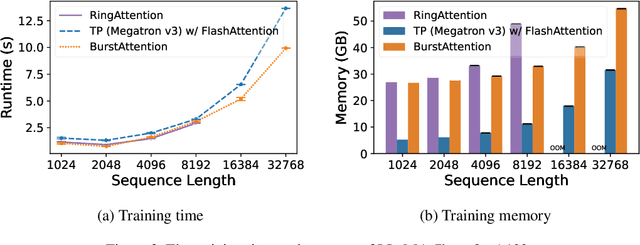
Abstract:Effective attention modules have played a crucial role in the success of Transformer-based large language models (LLMs), but the quadratic time and memory complexities of these attention modules also pose a challenge when processing long sequences. One potential solution for the long sequence problem is to utilize distributed clusters to parallelize the computation of attention modules across multiple devices (e.g., GPUs). However, adopting a distributed approach inevitably introduces extra memory overheads to store local attention results and incurs additional communication costs to aggregate local results into global ones. In this paper, we propose a distributed attention framework named ``BurstAttention'' to optimize memory access and communication operations at both the global cluster and local device levels. In our experiments, we compare BurstAttention with other competitive distributed attention solutions for long sequence processing. The experimental results under different length settings demonstrate that BurstAttention offers significant advantages for processing long sequences compared with these competitive baselines, reducing 40% communication overheads and achieving 2 X speedup during training 32K sequence length on 8 X A100.
CodeGeeX: A Pre-Trained Model for Code Generation with Multilingual Evaluations on HumanEval-X
Mar 30, 2023



Abstract:Large pre-trained code generation models, such as OpenAI Codex, can generate syntax- and function-correct code, making the coding of programmers more productive and our pursuit of artificial general intelligence closer. In this paper, we introduce CodeGeeX, a multilingual model with 13 billion parameters for code generation. CodeGeeX is pre-trained on 850 billion tokens of 23 programming languages as of June 2022. Our extensive experiments suggest that CodeGeeX outperforms multilingual code models of similar scale for both the tasks of code generation and translation on HumanEval-X. Building upon HumanEval (Python only), we develop the HumanEval-X benchmark for evaluating multilingual models by hand-writing the solutions in C++, Java, JavaScript, and Go. In addition, we build CodeGeeX-based extensions on Visual Studio Code, JetBrains, and Cloud Studio, generating 4.7 billion tokens for tens of thousands of active users per week. Our user study demonstrates that CodeGeeX can help to increase coding efficiency for 83.4% of its users. Finally, CodeGeeX is publicly accessible and in Sep. 2022, we open-sourced its code, model weights (the version of 850B tokens), API, extensions, and HumanEval-X at https://github.com/THUDM/CodeGeeX.
PanGu-Σ: Towards Trillion Parameter Language Model with Sparse Heterogeneous Computing
Mar 20, 2023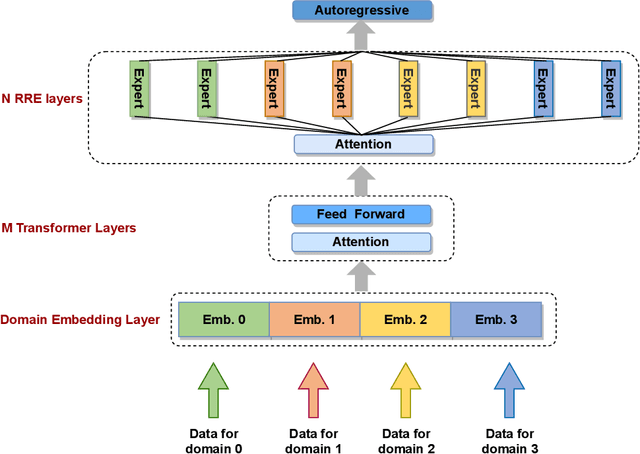

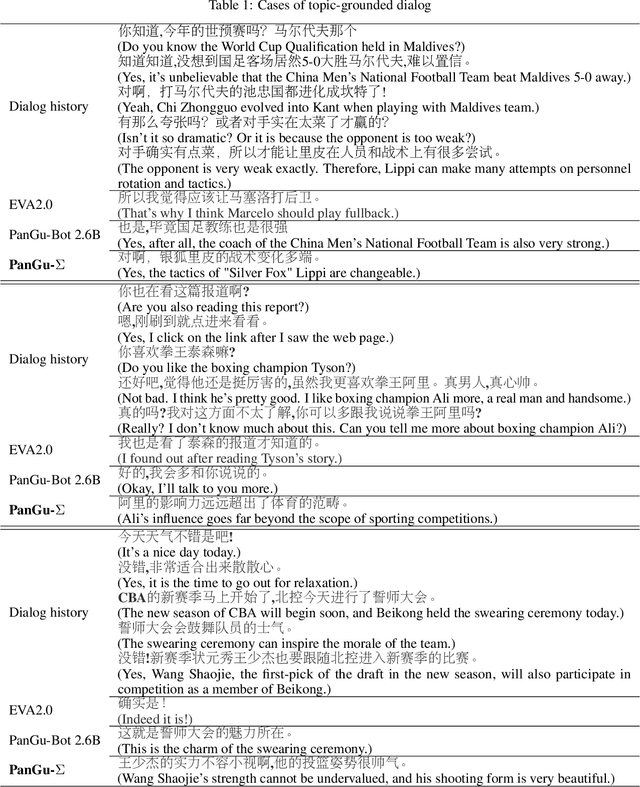
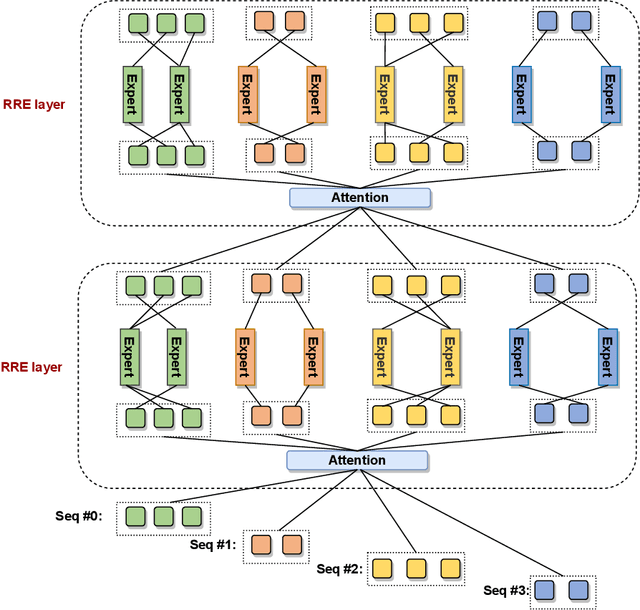
Abstract:The scaling of large language models has greatly improved natural language understanding, generation, and reasoning. In this work, we develop a system that trained a trillion-parameter language model on a cluster of Ascend 910 AI processors and MindSpore framework, and present the language model with 1.085T parameters named PanGu-{\Sigma}. With parameter inherent from PanGu-{\alpha}, we extend the dense Transformer model to sparse one with Random Routed Experts (RRE), and efficiently train the model over 329B tokens by using Expert Computation and Storage Separation(ECSS). This resulted in a 6.3x increase in training throughput through heterogeneous computing. Our experimental findings show that PanGu-{\Sigma} provides state-of-the-art performance in zero-shot learning of various Chinese NLP downstream tasks. Moreover, it demonstrates strong abilities when fine-tuned in application data of open-domain dialogue, question answering, machine translation and code generation.
PanGu-$α$: Large-scale Autoregressive Pretrained Chinese Language Models with Auto-parallel Computation
Apr 26, 2021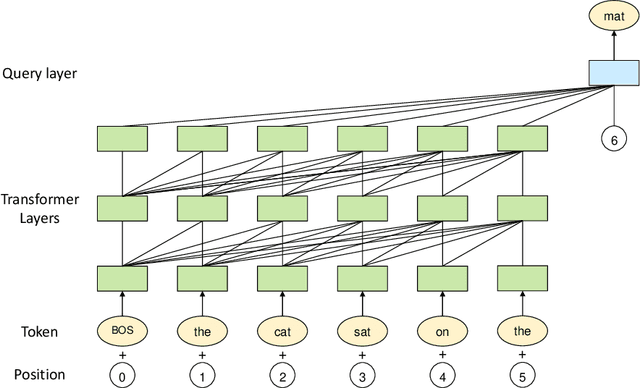
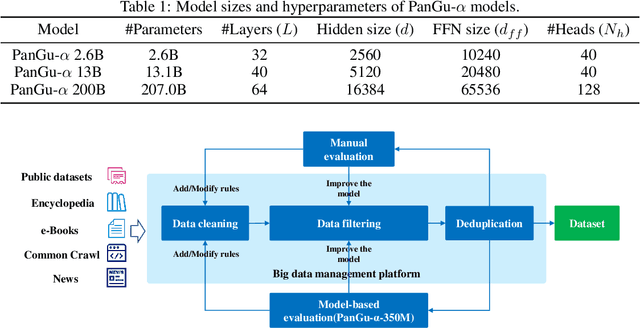


Abstract:Large-scale Pretrained Language Models (PLMs) have become the new paradigm for Natural Language Processing (NLP). PLMs with hundreds of billions parameters such as GPT-3 have demonstrated strong performances on natural language understanding and generation with \textit{few-shot in-context} learning. In this work, we present our practice on training large-scale autoregressive language models named PanGu-$\alpha$, with up to 200 billion parameters. PanGu-$\alpha$ is developed under the MindSpore and trained on a cluster of 2048 Ascend 910 AI processors. The training parallelism strategy is implemented based on MindSpore Auto-parallel, which composes five parallelism dimensions to scale the training task to 2048 processors efficiently, including data parallelism, op-level model parallelism, pipeline model parallelism, optimizer model parallelism and rematerialization. To enhance the generalization ability of PanGu-$\alpha$, we collect 1.1TB high-quality Chinese data from a wide range of domains to pretrain the model. We empirically test the generation ability of PanGu-$\alpha$ in various scenarios including text summarization, question answering, dialogue generation, etc. Moreover, we investigate the effect of model scales on the few-shot performances across a broad range of Chinese NLP tasks. The experimental results demonstrate the superior capabilities of PanGu-$\alpha$ in performing various tasks under few-shot or zero-shot settings.
TensorOpt: Exploring the Tradeoffs in Distributed DNN Training with Auto-Parallelism
Apr 16, 2020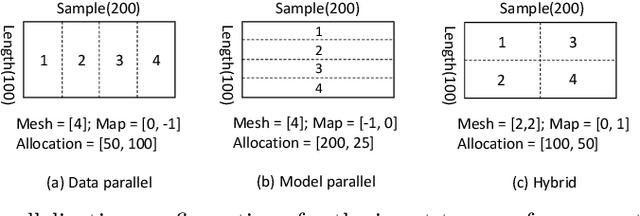

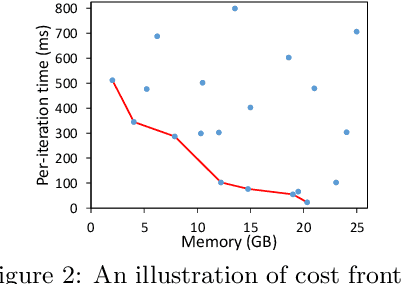

Abstract:A good parallelization strategy can significantly improve the efficiency or reduce the cost for the distributed training of deep neural networks (DNNs). Recently, several methods have been proposed to find efficient parallelization strategies but they all optimize a single objective (e.g., execution time, memory consumption) and produce only one strategy. We propose FT, an efficient algorithm that searches for an optimal set of parallelization strategies to allow the trade-off among different objectives. FT can adapt to different scenarios by minimizing the memory consumption when the number of devices is limited and fully utilize additional resources to reduce the execution time. For popular DNN models (e.g., vision, language), an in-depth analysis is conducted to understand the trade-offs among different objectives and their influence on the parallelization strategies. We also develop a user-friendly system, called TensorOpt, which allows users to run their distributed DNN training jobs without caring the details of parallelization strategies. Experimental results show that FT runs efficiently and provides accurate estimation of runtime costs, and TensorOpt is more flexible in adapting to resource availability compared with existing frameworks.
 Add to Chrome
Add to Chrome Add to Firefox
Add to Firefox Add to Edge
Add to Edge